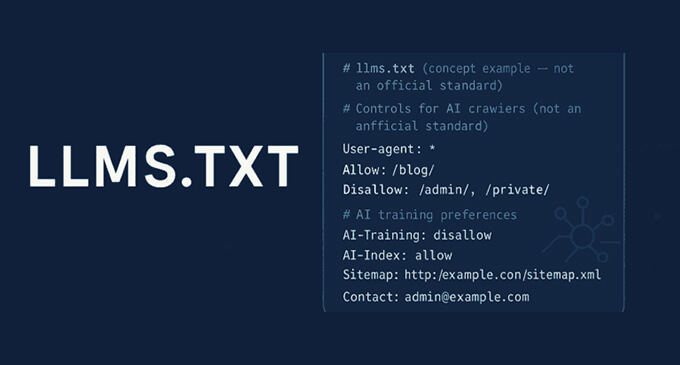LLMS.txt: Needless or Necessary?
AI and SEO are a marketing hot-topic. With generative tools, large language models, and AI-powered search assistants transforming how users find information, there’s a lot of excitement - and a fair amount of hype - around new technical strategies. In one of our recent team meetings, we discussed LLMS.txt for our SEO clients. At first glance, it seemed like a no-brainer. Feed the AI a file telling it exactly what pages we want to be indexed and shown. Spoon-feed the AI what we want. Perfect, right?
Spoiler alert: not so fast.

What Is LLMS.txt?
For those who haven’t come across it yet, here’s a general run-down of what llms.txt is (or proposes to be):
The Current Debate
Like most things in the AI/SEO space right now, the usefulness of llms.txt is still up for debate. Some experts see it as a forward-thinking tool that could help signal important content to AI systems. Others argue it’s unnecessary, especially since no major AI platform has officially adopted the standard.
Adding fuel to the discussion, one major voice in the industry—Google’s John Mueller—has publicly stated that llms.txt is not needed at this time. Meanwhile, some SEO tools have started flagging missing llms.txt files in audits, creating the impression that sites are “at risk” if they don’t have one. This has led to a bit of a bandwagon effect: tools include it, users assume it’s essential, and the cycle continues.
In reality, the consensus just isn’t there. For many sites, llms.txt may be optional at best rather than a critical piece of the SEO puzzle.
Our Take: Should You Bother?
From over 20+ years in SEO, we’ve learned a few foundational truths: what’s good for the user tends to be what’s good for search engines, and shortcuts rarely hold up long term. With that in mind, here’s how we see llms.txt fitting (or not) into a real SEO strategy.
When llms.txt might make sense:
If your site has a large “evergreen content” base or a lot of documentation or blog posts, and you want to ensure AI tools pull from your best material rather than orphaned or low-value pages.
When you’ve already got your core SEO fundamentals in place (site structure, internal linking, content quality, page speed, good user experience) and are looking for incremental advantages.
If you don’t mind maintaining an extra file, keeping it updated, ensuring it points to high-quality content, and possibly dealing with the edge cases (e.g. pages you no longer want surfaced, but which are hard to “remove”).
Why it’s probably not essential (yet) for most sites:
Because as of now, AI platforms aren’t using llms.txt in any standardized way. All the signaling is aspirational. So putting in the effort has uncertain payoff.
There’s risk of distraction: time spent maintaining an llms.txt might take away from more impactful work—quality content, good site structure, helpful answers, fast load times, etc.
If your content is already clean, well-organized, accessible, and regularly updated, AI tools will likely find and use your high-quality pages anyway, even without llms.txt.
Our Recommendation
We believe in building solid foundations. Our view is: llms.txt can be a nice to have—a forward-looking piece—but not something to build your SEO strategy around at this moment. Before you invest heavily in llms.txt, ask:
If yes to most of those, then llms.txt might help you squeeze out a little more, but it’s not going to replace the basics. If not, then invest your time in the basics.
What Good SEO Really Looks Like (No Shortcuts)
Here are the things we’re confident people must still do, regardless of llms.txt or the latest AI trend:
These are the ingredients that still matter most, always.
How does your site stack up?
Get a free SEO scan to uncover missed opportunities, quick wins, and strategies to help your site perform better.
